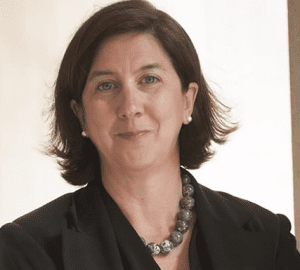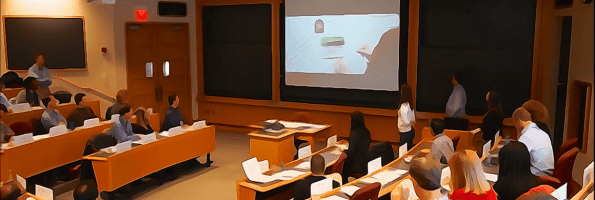Admissions Tip: How to Reapply to Business School

Consulting expert Alex Brown from Clear Admit recently offered up four incredibly valuable tips for potential students who want to reapply for a business degree, which you can read below.
With many MBA programs getting close to being ready to release their final round decisions, the application season will soon be coming to a close. While we would like to hope that today’s topic isn’t apropos for too many of our readers, we wanted to offer some advice to applicants who’ve been rejected from their preferred programs and are planning on reapplying next season. While it’s important to take some time to deal with the disappointment, it’s never too early to begin thinking about the next season, and there are a number of steps you can take to improve your candidacy and move toward a stronger application.
Reevaluate.
While it’s certainly difficult when things don’t go as planned, this is actually a great chance to take stock of your career and goals and to make sure that an MBA is still a logical and necessary step at this point. It’s this sort of reflection that can lead to refined career goals and a clearer sense of the reasons you need a business education.
Revisit your applications.
Once you’ve gained some distance from the emotional and time-consuming application process, it’s wise to review the materials you submitted to the schools with a critical eye. Having learned much about the process simply by applying, it’s likely that you’ll be able to identify a number of things that you could have done better. Whether you suspect your downfall was something like a strategic misstep in an essay or interview or a more glaring weakness like a low GMAT or lack of extracurricular involvement, there is plenty of time to address your shortcomings before submitting an application next year.
Consider your data points.
Your results this year may reflect some valuable information about your competitiveness at a top program. It’s important that you only apply to schools that you would be happy attending, but if you were unsuccessful at all of the programs to which you applied, it might be time to think about how realistic your list of target schools was and to add a few more to the mix. This is especially true for applicants who only applied to one or two programs this time around; there is an element of randomness and luck in the admissions process, and no matter how qualified the applicant, we recommend that a candidate target four to six programs to have a strong chance of success.
Schedule a feedback session, if applicable.
While it’s possible that you’ve identified your weaknesses in retrospect or even were aware of them when you went into the process, if you’ve been denied by a school that offers feedback to applicants and are planning on reapplying, you should absolutely take advantage of this opportunity to learn of the adcom’s perspective and demonstrate your commitment to the program. In fact, reapplying without seeking feedback when offered can raise questions for the adcom about how seriously an applicant is taking the process and the school. Of course, some schools do not offer feedback to anyone and others, such as Tuck, selectively offer feedback only to particularly promising candidates. There is naturally high demand for this service at programs that provide slots on a first-come, first-served basis, so it’s important that you make a point of requesting a feedback session at the earliest possible time.
Stanford GSB Has Updated Its Financial Aid Policy

Six weeks into a process to revamp financial aid protocol at Stanford Graduate School of Business (GSB), the school has shared the most recent updates in an ongoing review and re-imagining of how financial aid is awarded.
The decision to reassess the process, which Clear Admit covered two weeks ago, came not long after a data breach exposed that Stanford misrepresenting how it distributed financial aid. Data analysis revealed that the school had not been been awarding scholarships exclusively on the basis of need, but rather disproportionately based on other criteria including gender, immigration status, and work experience.
Dean Jonathan Levin clarified the Stanford financial aid policy in a public letter and pledged greater transparency moving forward:
“Stanford GSB’s communications over the years have explained the base level award process, but have not discussed the incremental fellowship awards,” he wrote. “I believe that a preferable approach, going forward, is to be significantly more transparent about the principles and objectives being applied in making financial aid awards, and about how different awards are made. We are committed to working on this for the current admissions cycle.”
In a letter to the Stanford GSB community on April 10, Assistant Dean for MBA Admissions and Financial Aid Kirsten Moss shared some of the progress the school has made in recent months, praising the student leaders who have guided much of the process.
“In February, the Student Association conducted several focus groups to learn about our students’ experience with financial aid at the GSB,” Moss wrote, adding that in March many of the focus group participants attended a co-design workshop to prototype new financial aid models. “We will be using these prototypes as the building blocks for the design of a new financial aid process,” she added. This month, the school will conduct additional focus groups with alumni and meet with faculty members from core academic areas.
The school has also established an advisory group made up of faculty, staff, and alumni to counsel its senior leadership and has hired a new financial aid project manager. Christi Opitz, a former Cambridge Associates investment consultant and HP finance department member, will “fully focus on supporting this initiative in the coming months.”
This article has been edited and republished with permissions from our sister site, Clear Admit.
Harvard Business, Wharton NYU Stern Commencement Speakers Announced

As spring fully arrives, so do the business school announcements for commencement day. Clear Admit has already discussed the graduation speakers you can expect at Michigan Ross and Stanford GSB. Now, Harvard Business School, Wharton, and NYU Stern have also announced their graduation speakers.

Harvard Commencement
At Harvard Business School, Carla Harris, vice chairman of Morgan Stanley, will deliver the MBA Class Day address. Harris (MBA ’87) has worked for three decades at Morgan Stanley, holding influential positions in mergers and acquisitions as well as equity capital markets. She’s also active at the university as a member of the Harvard University Board of Overseers. In addition, Harris is the focus of an HBS case study about emerging female and minority asset managers.
- Date: Wednesday, May 23, 2018
- Location: Baker Lawn
Wharton Graduation
 Hamdi Ulukaya, the founder, chairman, and CEO of Chobani, LCC, will speak at the Wharton MBA graduation ceremony. Raised in eastern Turkey, Ulukaya launched Chobani in 2007 with the goal of making good food more accessible. Within five years, Chobani had become the number one best-selling Greek yogurt brand in the United States. Beyond his business success, Ulukaya has also had a positive impact on communities through donations to charities, innovative profit-sharing, and paid parental leave.
Hamdi Ulukaya, the founder, chairman, and CEO of Chobani, LCC, will speak at the Wharton MBA graduation ceremony. Raised in eastern Turkey, Ulukaya launched Chobani in 2007 with the goal of making good food more accessible. Within five years, Chobani had become the number one best-selling Greek yogurt brand in the United States. Beyond his business success, Ulukaya has also had a positive impact on communities through donations to charities, innovative profit-sharing, and paid parental leave.
- Date: Sunday, May 13, 2018
- Location: The Palestra
NYU Stern Commencement
 At NYU Stern, graduates can expect to hear from keynote speaker Sallie Krawcheck, the CEO and co-founder of Ellevest, a newly launched digital investment platform for women. Beyond her entrepreneurial work at Ellevest, Krawcheck is the chair of Ellevate Network, a global professional women’s network, and Pax Ellevate Global Women’s Index Fund, which invests in companies that advance women. She’s also a best-selling author and previously served as CEO of Merrill Lynch Wealth Management, Smith Barney, and Sanford Bernstein.
At NYU Stern, graduates can expect to hear from keynote speaker Sallie Krawcheck, the CEO and co-founder of Ellevest, a newly launched digital investment platform for women. Beyond her entrepreneurial work at Ellevest, Krawcheck is the chair of Ellevate Network, a global professional women’s network, and Pax Ellevate Global Women’s Index Fund, which invests in companies that advance women. She’s also a best-selling author and previously served as CEO of Merrill Lynch Wealth Management, Smith Barney, and Sanford Bernstein.
- Date: Friday, May 18, 2018
- Location: Theater at Madison Square Garden
This article has been edited and republished with permissions from our sister site, Clear Admit.
New Northwestern Career Video Series Tells You How to Own Your Career

The Career Management Center (CMC) at Northwestern University’s Kellogg School of Management recently launched the “Own Your Own Career” video series aimed to develop brave leaders.
The series was created for prospective and current students, along with alumni, to discuss aspects of managing a career throughout its life cycle. The videos also touch on how Kellogg students can bring value to employers and demonstrate the qualities they seek.
The goal of the video series is not only to help students launch their careers, but also to help them gain the skills and mindset they need to manage their careers over a lifetime, explains Liza Kirkpatrick, senior director of the CMC for the full-time MBA program at Kellogg.

Kellogg Senior Director of Career Management Liza Kirkpatrick
“To that end, we enlisted some of the best minds at Kellogg to address topics that are foundational to owning your career—developing your network, career agility, resiliency, selling your career, and leadership.”
Kirkpatrick continues, “These quick videos tell a narrative about career management that will resonate with and be informative to a broad array of audiences, including prospective and current students.”
The first four episodes of the “Own Your Own Career” series are already online.
- Episode 1: Starting the Career Journey—The first episode highlights three different individuals: Liza Kirkpatrick, Adnan Rukieh, director of the CMC for the executive MBA and evening & weekend MBA; and Matthew Temple, director of the CMC for alumni career and professional development. Together they discuss how individuals can start their career right now.
- Episode 2: Professor Harry Kraemer on Networking—The second episode delves into the importance of networking, emphasizing the value of helping others so they might return the favor in the future. Kraemer talks about networking as a lifelong journey and a key to reaching the C-suite.
- Episode 3: Associate Dean and Professor Bernie Banks on Leadership—This third episode discusses what it takes to be an influential leader who inspires people to perform. Banks dives deep into the situational nature of leadership and how to get people to fulfill your expectations.
- Episode 4: Professor Carter Cast on Career Agility—In episode four, Cast talks about being self-reflective during a career transition. He encourages viewers to understand their strengths and weaknesses and to think several steps ahead when it comes to their career.
“The video series enhances and expands the CMC’s foundational work by highlighting faculty and industry thought leaders who can provide practical examples based on their experience of how to actively manage or own one’s career,” Kirkpatrick says.
“The series provides a roadmap for being proactive and present in your own career development and encourages students to continue asking the right questions to shape their career, not only while looking for a job, but throughout their entire career life cycle.”
This article has been edited and republished with permissions from our sister site, Clear Admit.
Starting a Business Straight Out of School? How HBS Supports Student Entrepreneurship

This coming weekend, Harvard Business School (HBS) will host an annual Entrepreneurship Conference sponsored by its own homegrown Entrepreneurship Club. The conference brings together hundreds of participants including “founders, joiners, and venture capitalists,” all of whom hope to connect through a smorgasbord of lectures, panels, chats, and networking sessions.
This year’s conference, scheduled for Saturday, March 31, is expected to draw more than 500 participants, including many top professors and professionals holding court on a variety of topics. Three keynote lectures will be given by CEOs and founders from Catalant Technologies, Strava, and edX. Strava’s Michael Horvath, who is also a professor of entrepreneurship at Dartmouth’s Tuck School of Business, will share his experiences having held several high-level roles at multiple startups.

Tuck Professor and Strava Co-Founder Michael Horvath will give one of the Entrepreneurship Conference’s keynote addresses.
In addition to the keynote lectures, the conference is also stacked with nine different panels. Some will include general discussions on topics such as starting a business during your MBA program and financing your startup. Others are more specific, covering some of the hottest fields in entrepreneurship right now. Examples of these include “Blockchain: The Next Transformative Technology?” and “AI/ML: Artificial Intelligence in Diverse Contexts.” Finally, attendees will also get to take part in a venture capitalist meet-and-greet and a networking lunch and cocktail hour.
HBS is extremely supportive of entrepreneurship, according to Jim Aisner, the school’s director of media and public relations. He spoke at length about the myriad ways in which HBS is a fantastic place for both seasoned and budding entrepreneurs, underscoring the range of support Harvard’s large entrepreneurial community offers to those looking to start their own businesses.
“Entrepreneurship is a major component of life at HBS, with some 35 faculty members doing research, course development, mentoring/advising, and teaching in this area,” Aisner told Clear Admit.
Harvard’s program requires all first-year MBA students to take an entrepreneurship course, and there are also a large number of entrepreneurial-focused electives on offer in the second-year Elective Curriculum. In addition, the school boasts multiple conferences and events that reach programs outside the business school. “There is a whole ecosystem [at Harvard] promoting and nurturing entrepreneurship,” Aisner notes.
Significant Programming Supports HBS Student Entrepreneurs
HBS is also home to the Arthur Rock Center Accelerator, which helps selected teams develop their ventures over the course of the year. In addition, the Rock Accelerator offers summer fellowships to support students from the entire student body who seek to develop entrepreneurial ventures during the summer and hosts a semiannual conference that brings 100 alumni back to campus each year.
Rock Venture Partners is a program that lets small groups of students learn more about investing in startups by supporting Rock Accelerator teams as they go through pitching and starting their ventures. Then there is the Harvard Innovation Lab, or i-lab, a resource available to current students at any Harvard school interested in exploring innovation and entrepreneurship at any stage. “The Innovation Lab creates a hotbed of cross fertilization for teams from across the university,” says Aisner.
Given this supportive environment, it won’t come as a shock that many HBS students decide to start their own businesses rather than pursue a more traditional career path in their post-MBA life. Out of more than 900 students, eight percent of graduates from the Class of 2017 chose to start their own businesses upon graduation, up from six percent in the Class of 2016. Although this growth is indicative of a national trend toward more and more recent MBA grads founding startups, HBS outperforms many top schools in this regard. By comparison, at Chicago Booth just 3.2 percent of 2017 MBA grads went immediately into running their own startups. Meanwhile, at the University of Pennsylvania’s Wharton School, just 2.3 percent of the most recent graduating class founded businesses.
As another indicator of its commitment to fostering entrepreneurship, HBS will host its annual New Venture Competition on April 18th, which bestows more than $300,000 in prize money to outstanding new ventures. Contestants may apply in either the business track, with ventures that drive substantial market value, or the social enterprise track, with ventures that drive social change. This recent Clear Admit article noted that the social enterprise track received 69 entries this year, more than ever before.
Nationwide, more and more students have begun to pursue startups at all stages of their MBA careers. From this weekend’s student-led Entrepreneurship Conference to the wide range of related centers, faculty, and other support, HBS’s investment in nurturing its entrepreneurial students is clear.
This article has been edited and republished with permissions from our sister site, Clear Admit.
Georgetown Launches Implicit Bias Training Program for MBA Students

Georgetown University’s McDonough School of Business puts a premium on the ethical and social dimensions of business, both in terms of its curriculum and its expectations of MBAs. The Graduate Women in Business (GWIB) student club seeks actively to uphold McDonough’s attitude toward social responsibility. In 2017, GWIB announced the launch of its implicit bias training program.
The pilot program, which was developed as a collaboration with the MBA Program Office, seeks to increase awareness of implicit bias in the workplace and to integrate training against it as part of the MBA student experience. It helps participants looks at how implicit bias unconsciously affects actions and decisions related to hiring and promotion practices, client services, and organizational culture.
The goal of the new program is to offer more comprehensive training than those typically offered by corporate implicit bias programs.
GWIB researched curricula, trainers, and other details for more nine months before inviting Bryant Marks, a seasoned implicit bias trainer and the lead trainer at the National Training and Education Institute, to facilitate the pilot. Marks also has experience as an associate professor of psychology at Morehouse College and as the former senior advisor to the White House Initiative on Historically Black Colleges and Universities.
During its first semester the training program attracted 30 participants, including students, faculty, and administrators. Participants reported that the training was “relatable” and of the data Marks presented, “some were a revelation.”
According to Kerry Pace, associate dean of MBA programs, implicit bias training is absolutely vital for students. She elaborated in a press release that this type of training “better prepares students for successful careers as principled business leaders and continues to improve our amazing community. By spending time reflecting on and acknowledging our own biases, we are following our Jesuit heritage of women and men in service to others and to ourselves.”
To learn more about the new program as well as other social justice avenues to explore at Georgetown McDonough, read the original press release.
